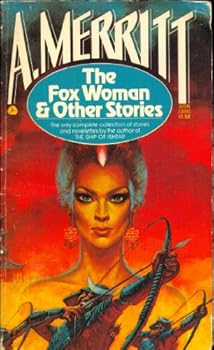
![]() The Fox Woman and Other Stories by Abraham Merritt
The Fox Woman and Other Stories by Abraham Merritt
The Fox Woman and Other Stories is the only collection of Abraham Merritt’s shorter works, and contains seven stories and two “fragments.” These short stories span the entire career of the man who has been called America’s foremost adventure fantasist of the 1920s and ’30s. Several of the tales boast the lush purple prose of Merritt’s early period (as seen especially in his first two novels, The Moon Pool and The Metal Monster), but all seven are finely written little gems. They run the gamut from full-blown fantasy to lost-world adventure to outright science fiction, and abundantly demonstrate that Merritt was a master of the concise short form as well as the full-length novel.
The collection kicks off with one of its strongest tales, “The Fox Woman,” a tale of revenge in a remote part of 20th century China. Here, a young American woman is attacked by a band of assassins and is aided by the shape-shifting entity of the title. This is one of Merritt’s most poetic works, and one of his most unpredictable.
“The People of the Pit” follows, and is a lost-world tale that takes place in the wilds of the Yukon. A dying explorer tells the story of a civilization that he found far underground; one that contains a kind of semi-invisible snail/light populace. This is a tale that lovers of H.P. Lovecraft will enjoy, what with its bizarre creatures, brooding temple god and atmosphere of creeping menace. This is one memorable story, indeed.
“Through the Dragon Glass” is a fantasy that tells of a man who enters a kind of alternate world by passing through an ancient Chinese relic. Just as Lewis Carroll‘s Alice had done, Jim Herndon in this tale has some truly bizarre adventures.
In “The Drone,” a group of men (including Alan Caranac, hero of Merritt’s Creep, Shadow, Creep!) sit around and throw tales back and forth: tales concerning men who had the ability to change themselves into animals. We hear of a man/hyena in Ethiopia and a man/bee in the wilds of … New Jersey, and some theories for these happenings are propounded in very interesting fashion.
“The Last Poet and the Robots” is, as far as I know, Merritt’s only piece of futuristic sci-fi, taking place as it does in the 30th century. Here, a band of scientists who have decided to live underground, away from the society they care little about, come to Man’s aid when those pesky robots revolt. This tale features the outrageous super-science and way-out gizmos that typified much of the sci-fi of the 1930s.
“Three Lines of Old French” is the next offering, and is one of the loveliest tales in the book. Merritt himself appears as one of the characters in the tale’s intro, but the story really concerns a young American soldier who seems to meet a French girl of 200 years ago whilst he is on guard in his World War I trench. Or perhaps I shouldn’t say “seems to?” This is one charming fantasy indeed.
Up next are two short fragments that were meant to be the openings of novels that Merritt never completed. “The White Road” tells of a young man who has had visions of that road since childhood. It’s hard to tell just where Merritt intended to go with this tale, on the basis of the six pages that remain.
“When Old Gods Wake” was meant to be a sequel to Merritt’s novel The Face in the Abyss, set in Mexico, apparently, rather than the earlier book’s Peru. The fragment entices with its exotic setting, squabbling lovers, and hints of elder gods coming back to life.
The collection ends with “The Women of the Wood,” a beautiful tale of a man who gets caught in a clash between some woodsmen and the dryads that they are endangering. This is the type of story that fans of Algernon Blackwood will appreciate … not to mention all “tree huggers.” Blackwood always excelled at this kind of “Nature personified” tale, and Merritt here demonstrates that he was no slouch at the game himself. Anyway, this collection is a must for all Merritt fans, and for fantasy fans in general. Abraham Merritt surely did have a style all his own, and after reading The Fox Woman and Other Stories, one will feel compelled to admit that that style translated extremely well to the shorter form. Seek this one out, by all means!



As always, your excellent review makes me go look on my shelves to find my copy of this and read it. Great descriptions of the stories!